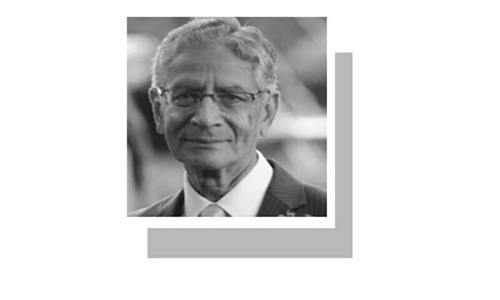KARACHI, Sept 5: There is a great need for making concerted efforts to change the mindset of society in order to effectively check the menace of discriminatory attitudes towards the marginalised sections.
These views were expressed on Friday at the launching ceremony of a report on ‘Long Behind Schedule— a study on the plight of Scheduled Caste Hindus in Pakistan’.
The 84-page report has been prepared jointly by the Pakistan Institute of Labour Education and Research (Piler) and Thardeep Rural Development Programme with both financial and technical assistance extended by the International Dalit Solidarity Network and the Indian Institute of Dalit Studies.
It is worth mentioning that similar studies on caste-based discrimination in South Asia had also been conducted in other countries including Sri Lanka and Bangladesh.
Speaking on the occasion, the speaker of the Sindh Assembly, Nisar Ahmad Khuhro, admitted that some form of discrimination had always existed but the situation aggravated during General Ziaul Haq’s era due to the promulgation of a number of discriminatory laws. The main reason for the enactment of such draconian laws, he said, was just to prolong his tenure by creating divisions among various sections of society on the basis of ethnicity and sects.
The dictatorial regime did not even spare the curriculum due to which extremist tendencies made their way to educational institutions and had affected children during their formative years.
It was mainly due to those policies, he added, that our society continued to face great challenges from the extremist elements who did not believe in tolerance and coexistence.
He stressed the need for cleansing the curriculum of such pollution so that a tolerant and enlightened nation could be raised that believed in a peaceful coexistence.
Referring to a few examples quoted by earlier speakers that scheduled caste people were not provided with seats in public transport or were forced to use separate utensils, he said that such things could not be changed by formulating some laws, as these attitudes were the results of a social mindset that needed to be changed.
He was of the view that such a change was only possible by creating awareness about social equality and tolerance.
Retired Justice Rasheed A. Razvi said that besides formulation of laws putting an end to such discrimination, popular leaders who commanded respect in society could also play a positive role in changing social attitudes.
He said in jest that while people belonging to the scheduled caste were termed untouchables, there were some other elements in our society who could be called untouchables.
Elaborating he said, those included people accused of swindling billions of rupees, killing people and committing heinous crimes as they had also been made untouchables with the formulation of special laws and these also included uniformed untouchables.
He demanded that all people be treated equally and nobody should be considered and termed untouchable.
Mr Razvi said that it was difficult to end discrimination that had been engrained in society just by introducing some laws. While such laws were necessary, efforts should be made to create awareness among the masses so that their attitudes were changed and they treated others as equals.
Baloch nationalist leader Hasil Bizenjo said that the state had not given due rights to its smaller federating units that had been guaranteed in the Pakistan resolution or even later in the constitution.
He said that the Pakistan resolution had guaranteed that all the units would have autonomy, right over their resources, and the caste system would be abolished. Despite the passage of over 60 years, he said, none of these promises had been fulfilled.
A former Punjab MPA, Manohar Bheel, said that a large number of minor scheduled caste girls were kidnapped and married off and when the family members approached the police they were told that she had converted to Islam. He said that such cases were on the rise in his native Bahawalpur area.
Karamat Ali of the Piler, Beena Sarwar, Giyan Chand, Najeeb Ahmad, Bhuromal Kolhi, Mangla Sharma, Arjandas Advocate, Dr Jaipal Kalji, Amarnath, Zahid Farooq, and others also spoke.
The ceremony was conducted by Zulfiqar Shah. Moreover, Manoo Bheel, whose nine family members were kidnapped years back and who had been protesting since then, was also invited to the function.
The speakers urged the relevant authorities to take action for the recovery of his family members.











































Dear visitor, the comments section is undergoing an overhaul and will return soon.